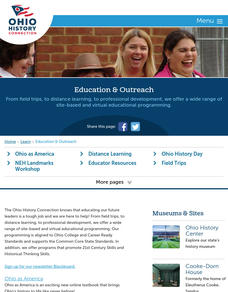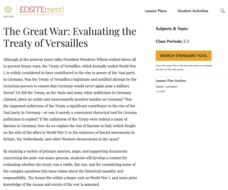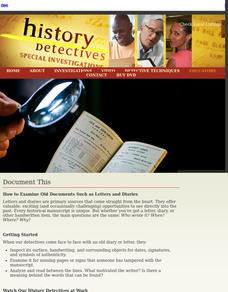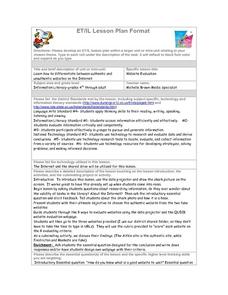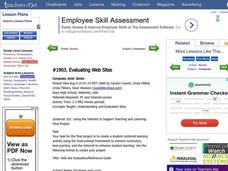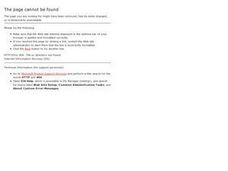Curated OER
Lesson Plan: The Tour Starts at Noon
The Eleven-Headed Bodhisattva is a piece that represents characteristics, meanings, and ideals common to those who practice Buddhism in Japan. Learners fully analyze this piece, then take a virtual trip to examine the Buddhist temples...
News Literacy Project
News Goggles: Lionel Ramos, Oklahoma Watch
Given all the recent criticism of the news media and coverage, it's crucial that young people are given the tools they need to evaluate what they see, hear, and read about current events. A video interview from "News Goggles" introduces...
Curated OER
Using Primary Source Documents
Students examine copies of primary source documents and determine the document's value to a researcher. They analyze and evaluate the document for bias or contradiction. They know the difference between a primary and secondary source.
Curated OER
The Great War: Evaluating the Treaty of Versailles
Young scholars examine and evaluate the Treaty of Versailles. They read and discuss primary source documents, explore various websites, develop a list of postwar goals for France, Germany, and the U.S., and evaluate whether the treaty...
Curated OER
Rhetorical Devices in a Primary Source
Analyze Martin Luther King Jr.'s famous and powerful "I Have a Dream" speech as a primary source document. After reading up on rhetorical devices and working in small groups to define terms, class members identify and explain the use of...
Newseum
Putting the Consumer's Questions to Work
Who, what, when, where, why, and how are good questions to ask when evaluating a source. First, scholars find two sources of information relating to a chosen topic. Next, pupils complete a worksheet to gauge the source's credibility....
EngageNY
Applying Research Skills: “Rachel Carson: Environmentalist and Writer”
It's important to cite sources! Scholars take a closer look at their research about DDT by examining how to cite sources. Learners take turns sharing information that would be used to cite sources to complement Rachel Carson:...
Curated OER
Qualifying to Vote Under Jim Crow
Literacy tests, poll taxes, grandfather laws? Scholars study the systematic ways African-Americans were kept from voting even after it was made a law. They analyze a series of primary source documents, complete a worksheet, and engaged...
Center for History and New Media
Slavery and Free Negroes, 1800 to 1860
What was life like for enslaved and free black people before the American Civil War? Explore the building tension between states and the freedom of individuals with a thorough social studies lesson. Learners of all ages explore primary...
PBS
Document This
Being a historian requires serious sleuthing. They examine primary source documents and look for evidence, for clues that reveal who wrote the document, when, and why. After watching two historians model the process, young history...
Newseum
Evidence: Do the Facts Hold Up?
Sometimes it's hard to escape bad information! Pupils learn the E.S.C.A.P.E. method for evaluating news sources and complete a worksheet to assess a news article using their new skills.
Newseum
Bias Through History: Analyzing Historical Sources
Young journalists use the E.S.C.A.P.E. (evidence, source, context, audience, purpose, and execution) strategy to evaluate historical and contemporary examples of bias in the news. The class then uses the provided discussion questions to...
Curated OER
Using Primary Source Documents in the Classroom
Students use primary documents to explore the past. They consider the source of the documents and identify and biases that the author may have held. They identify any questions about the historical event that may remain after reading the...
Curated OER
Current Sources of Energy to Maintain a Sustainable Future
In small groups, fourth graders identify different sources of renewable and non-renewable energy. They research the pros and cons of using each of these resources. They rank household appliances according to energy usage and efficiency....
Curated OER
Hamlet Research Paper: Find, Evaluate, and Select Appropriate Research Sources
Help young researchers find credible sources online. Modeling with a Google search for information about Shakespeare’s Macbeth, use a computer projector or Smart Board to show class members how weak the top three search results are....
Curated OER
Using Primary Sources
Students examine primary source documents about slavery in the United States. They evaluate the documents for the evidence they provide, reliability and bias. They present their evaluation to the class.
National Endowment for the Humanities
Using Historic Digital Newspapers for National History Day
Your learners will take a trip through history as they peruse through historic digitalized newspapers, reading real articles from such historical periods in the United States as the Temperance movement and passage of the Thirteenth...
EngageNY
Gathering Information about Screen Time: Assessing and Reading Internet Sources, Day 2
Calling all researchers! Using the resource, scholars continue conducting independent Internet research about a chosen research question. As they browse the web in search of articles to answer their questions, pupils paraphrase their...
Curated OER
Website Evaluation
Students examine how to differentiate between authentic and unauthentic websites on the Internet. They view and discuss a photo of a shark that is a hoax, then discuss the eight ways to evaluate websites. Students then evaluate three...
Curated OER
Evaluating Web Sites
Students examine how to evaluate a website. They discuss a graphic organizer, conduct Internet research, and apply a checklist of criteria to various websites.
Curated OER
William Apess and the Mashpee "Revolt" of 1833
Prompt your class with the following question: What was the status of American Indians in Massachusetts during Jackson's presidency? To answer this question, class members will read a series of primary source documents (attached),...
Curated OER
Note-Taking: K.I.S.S. "Keep It Short and Simple"
Note-taking is an essential study skill, and it needs to be taught! In the context of a research project on energy sources, learners find multiple sources, evaluating, paraphrasing, and citing them correctly. Two lists with note-taking...
Curated OER
The Federalist Defense of Diversity: Extending the Sphere
How did early Americans ensure expansion while also securing the rights of citizens? Alexander Hamilton and James Madison, two of our early leaders, considered the problem of faction to be the "mortal disease" that created unstable...
Curated OER
Lesson 8: Prithee, Pause!
High school learners examine primary source materials on history and the supernatural which relate to Julius Caesar. They then act out a scene based on different historical understandings and identify facts, theories, and similarities in...




